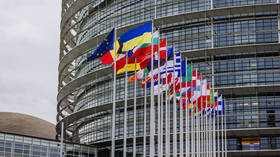EU to bypass Hungarian veto on tapping Russian assets – FT

The European Union has developed a scheme to use profits from frozen Russian assets to secure a $50 billion loan for Ukraine, which will be used to purchase arms, the Financial Times reported on Monday, citing the bloc's top diplomat, Josep Borrell and other sources. The loophole effectively bypasses Hungary’s opposition to legislation that would have allowed the EU to hand over interest accrued on Russian funds to Ukraine.
In an interview with the FT, Borrell said that since Budapest had opposed an EU agreement to transfer revenue to Ukraine, it “should not be part of the decision to use this money.” He added that the bloc’s workaround was “sophisticated as every legal decision, but it flies.”
The West froze around $300 billion in Russian sovereign assets when the Ukraine conflict escalated, trapping around $280 billion in the EU.
Earlier this year, Brussels proposed seizing the interest earned on the assets to acquire weapons for Ukraine. The suggestion faced resistance from Hungary, a vocal critic of the West’s approach to the Ukraine conflict, particularly its arms shipments to Kiev.
Under the US-led initiative, proceeds generated by Russia’s frozen assets from next year will be used to pay off the loan.
The legal loophole allowing the EU to tap Russian assets is likely to suffice in guaranteeing the payout of the loan, the outlet said, citing officials familiar with the matter.
However, Budapest can still block an EU decision to extend sanctions on Russian funds, which has to be renewed every six months by the bloc’s 27 members, the officials added.
To placate Hungary, the EU proposed a deal under which its share of the bloc’s funds would not be used to purchase weapons for Ukraine in exchange for not vetoing other members transferring the revenue to Kiev, according to Borrell.
“We have offered Hungary: your money will not be used to support Ukraine in any means. Not just lethal, but on anything,” Borrell said. The proposal, however, has been rejected by Budapest.
Moscow has denounced the decision to transfer profits from its assets to Ukraine as a blatant and illegal “expropriation.”













